“We Learned Very Little From 2016”: Dean Phillips Is Still Worried About the Democratic Party’s Strategy
A conversation with former Biden primary challenger Representative Phillips on the election, his run for presidency, and the future of the party.
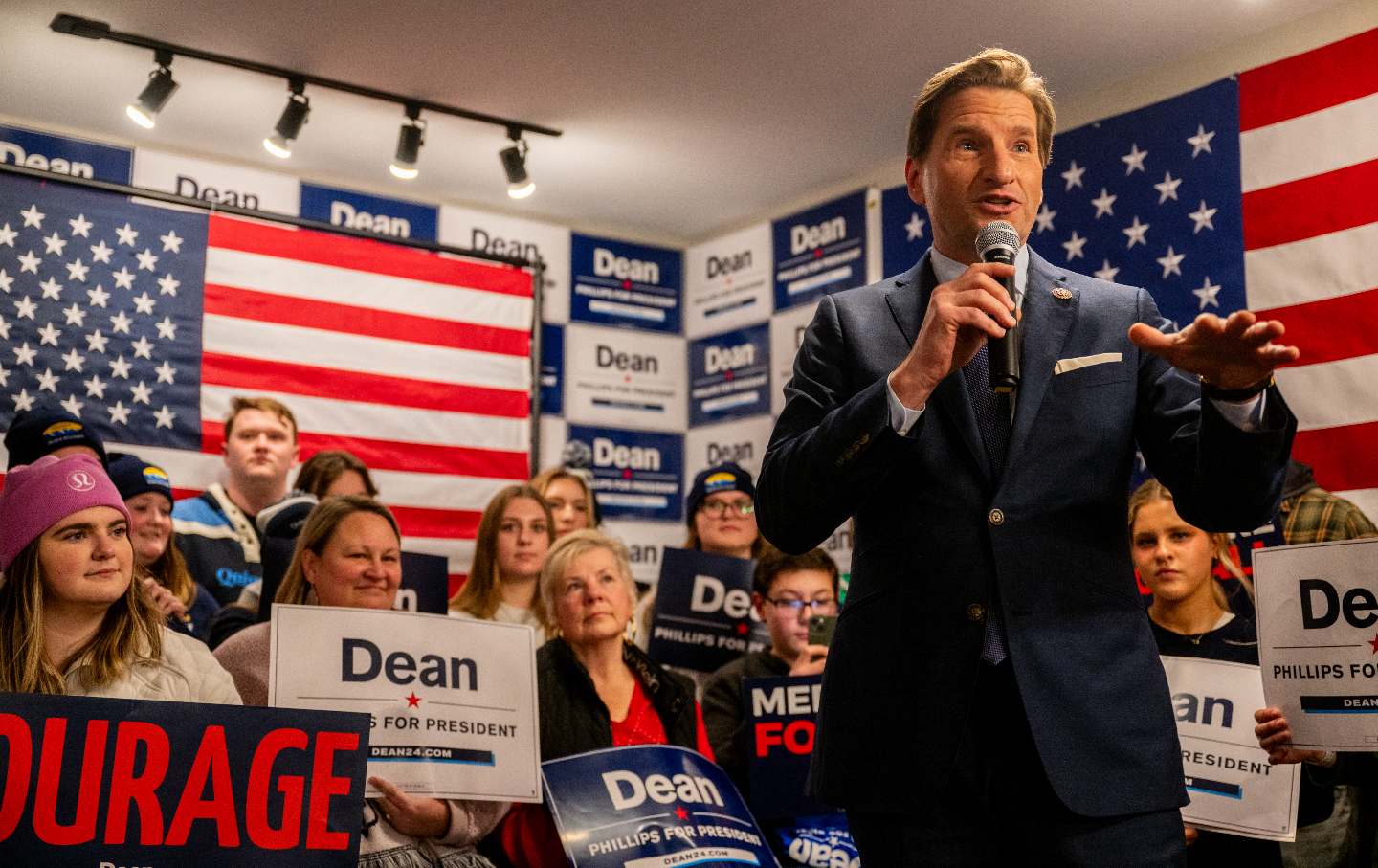
Representative Dean Phillips speaks to supporters during a campaign rally on January 22, 2024.
(Brandon Bell / Getty)
Gathered at his alma mater in Providence, Rhode Island, Representative Dean Phillips addressed a crowd of largely despondent Brown University students, faculty, and staff who were grappling with the impending Donald Trump presidency.
In October 2023, Phillips stepped down from his role in the Democratic House leadership over his party’s support for President Joe Biden’s reelection. Later that month, Phillips sacrificed his House seat in Minnesota to launch a presidential bid, further sounding an alarm that many within the Democratic Party refused to acknowledge: If Biden runs against Trump, Biden will lose.
The move made Phillips an outcast within his own party. He was ridiculed by establishment figures as weakening Biden’s candidacy and detracting from the administration’s record. But after Biden’s disastrous June debate performance, the president’s support, one by one, began to crumble on Capitol Hill.
Within a few weeks, Vice President Kamala Harris had all but formally clinched the Democratic nomination with the backing of Biden’s endorsement. A mere three months later, she lost the election, paving the way for Trump’s return to the White House.
After imploring the audience not to lose hope, Phillips sat down with The Nation to discuss weaknesses he sees within his own party, the internal Democratic frustrations with Biden’s bid for a second term, failures in party messaging, and what Democrats must do to win.
This interview has been edited for length and clarity.
Owen Dahlkamp: It’s been about a week since the election. How are you feeling?
Dean Phillips: I think all of America would agree it’s a sense of relief to have another stressful and anxiety-ridden election behind us. But obviously, I, like many in this country, emerged very disappointed because the result was about as predictable as it was preventable.
OD: When you decided to challenge President Biden for a second term last October, you said that he would lose to Donald Trump if there were to be a rematch. As you look at the results of this election, in retrospect, do you think that is still the case?
DP: No question. I never did imagine that my party would make the same mistake twice, which is to employ selection over election. That’s why we were going to lose handily if Joe Biden had run. And frankly, I think it’s the same result, because, again, we chose to ignore people’s voices in favor of party insider voices. That will always result in a candidate who may be less than ideal for the moment.
OD: In the primaries generally, we’ve seen preference for establishment Democrats, whether by allegedly pushing out opposition in favor of an incumbent or party insiders’ bias influencing the outcome. In theory, these primaries are supposed to battle-test any potential candidates before they face off against their GOP opponent. What, if any, changes do you think need to be made to the Democratic primary process?
DP: A primary process should be a primary process. This past season was anything but, as evidenced by the clear collusion between state party chairs and committees and the Democratic National Committee. They suppressed competition, ensured that there be no debate, and prevented voters from choosing among more than one option in many states.
That is antithetical to democracy and certainly antithetical to Democratic Party principles. It resulted in two candidates who couldn’t win. And I think that’s all the evidence one needs to recognize that significant changes must be made if the party wishes to win national elections.
OD: Do you think that a debate between yourself and other Democratic challengers would have been beneficial? Is this something that should be implemented in future presidential primaries, regardless of the candidate’s incumbency?
DP: It should be mandatory. It should be an expectation of American voters. The limited debate between even the ultimate nominees of each party is shameful, and we have to return to more transparency and more exposure and more debate.
My run wasn’t about me. It was about having a legitimate, invitational, competitive, spirited primary. That means debate. And had there been other candidates on a primary stage, I’m almost certain that Americans, at least Democratic primary voters, would have selected someone in a better position to ultimately beat the most dangerous Republican candidate of our lifetime.
OD: We saw President Joe Biden’s faltering debate performance in June against Donald Trump. I’m curious if you think that primary debates would have shown Biden’s capacity earlier?
DP: It was something I had seen up close and personal, which is what compelled me to bring it to the country’s attention and ultimately participate in the primary. It’s what many of my colleagues had seen. Do I think he would have exposed the country to his physical and communicative decline in a way that may have prevented this tragedy if he had debated earlier? Absolutely.
I think the only people who were surprised that night were the hundreds of millions of Americans who had been subject to the encapsulation of the president by his team, and I think that was a disservice to the country and the Democratic Party. Without sunlight, we will assuredly have darkness.
OD: After President Biden decided to withdraw his candidacy, he almost immediately endorsed Vice President Harris. Do you think that she should have faced an open primary process after President Biden dropped out?
DP: Yes. It’s what former President Obama had indicated was important. It was even something that Jim Clyburn, one of the great lions of the US House, had indicated would be important for the same reasons I felt it would be important: to give a test to potential VP nominees, to introduce the country to potential presidential nominees, and ensure primary voters had options.
OD: In terms of your colleagues in Congress, did it come as a surprise when President Biden announced his reelection bid?
DP: Yes. It came not just as a surprise, but as a disappointment.
I am a passionate supporter of President Biden and felt it was in both his best interests and certainly the country’s best interest to fulfill what was his implicit promise, which was to be a bridge to the next generation. This indicated a one-term presidency. I’m sad to think he impacted his own legacy and the country’s future by making yet another example of politicians hanging on too long. That has been a great detriment to the Democratic Party over the last number of years, as evidenced by Biden, former Supreme Court Justice Ruth Bader Ginsburg, former senator Dianne Feinstein, and now we’re even talking about Supreme Court Justice Sonia Sotomayor. I just hope that those in positions to put the country first would do so and be a model for the country.
Popular
“swipe left below to view more authors”Swipe →OD: Vice President Harris performed worse than President Biden in nearly every battleground county. Democrats have lost control of the Senate and will likely lose control of the House. Why do you think that Democrats are facing such a sweeping rejection from the American people?
DP: I think we learned very little from 2016. I believe Democrats have become, in many cases, a party centered on imposition and condemnation instead of invitation. And I think that alone can explain electoral results.
OD: Senator Bernie Sanders forcefully condemned the party’s supposed abandonment of working families. Is this something that you agree with?
DP: I think there’s some degree of truth in Senator Sanders’s perspective. I don’t believe we’ve abandoned working families from an economic perspective, but I do believe American families feel culturally abandoned by the Democratic Party. That goes back to my heartfelt belief that we become a party more accustomed to using condemnation rather than invitation. Therein lies the root of the fundamental challenge that we face.
OD: Many of the Democratic ballot priorities in various states, no matter how red or blue, did succeed. There seems to be a disconnect between Democratic values and what voters feel like the party stands for. Does this suggest a messaging problem or a problem with the Democratic Party’s platform itself?
DP: I believe the Democratic Party has a pretty good product, as evidenced by the fact that some deep-red states who overwhelmingly favor Donald Trump for president also voted for ballot measures to which this president-elect is opposed. It means that our packaging—our distribution and our messengers—are not meeting the needs of the party to succeed. I just hope that those in positions of power who to most of us are nameless, faceless, and unknown take that to heart and recognize what their strategies have gotten us.
We need to improve in both messengers and messages, starting with initiatives like “defund the police. ”While it’s a worthy debate in this country about what role law enforcement should play, attaching a tagline like that is horribly destructive. A significant issue to an overwhelming majority of Americans is our southern border disaster. To ignore that, not have a message for it, and not acknowledge it is a dereliction of duty.
“Bidenomics” was about as poor packaging and branding as you could possibly come up with. We should be more strategic in elevating and packaging and distributing our products, if we want to win.
OD: I’m assuming that’s the goal of all Democrats right now.
DP: Sometimes I wonder.
OD: Since Donald Trump descended the golden escalators in 2015 and announced his bid, Democratic messaging has centered on calling him a threat to the American way of life. Do you think the focus on “anti-Trump” messaging has obscured the purpose of the Democratic Party?
DP: Absolutely. That’s reflected in my belief, again, that condemnation is a very poor strategy for success in politics. Casting that same shadow on all of those that support him is just an absurd and destructive approach. I think it has, in no small part, affected Democrats’ brand and ability to attract the very voters that we need. That’s why we’ve seen a rightward migration in just about every single precinct and county in this country. It’s not an anomaly. It’s time for a wake-up call.
OD: When you announced your presidential bid, you were largely chastised by the Democratic establishment. After seeing the results of this election, after seeing what happened with President Biden’s candidacy, does any part of you feel vindicated?
DP: It is a form of vindication, but it is the most unsatisfying form imaginable. The mission wasn’t personal. It was based on principle. So the vindication surely hasn’t been as gratifying as anyone might imagine.
OD: Come this January, you will no longer be a member of the US House of Representatives. What’s next for you and your relationship with the Democratic Party?
DP: Just as I had offered the Biden campaign—and the Harris campaign—my perspectives and ideas and counsel, I offer it to my party.
I’ve been a Democrat my entire life and still aspire to play a role in making us more competitive and effective. And if that invitation is accepted, I look forward to working together. If it’s not, I believe it’s time to explore creating competition for both parties because we have, I think, a fatal flaw in our electoral system right now: the allowance of two private corporations, the Democratic Party and Republican Party, to maintain a monopoly on our democracy.
Disobey authoritarians, support The Nation
Over the past year you’ve read Nation writers like Elie Mystal, Kaveh Akbar, John Nichols, Joan Walsh, Bryce Covert, Dave Zirin, Jeet Heer, Michael T. Klare, Katha Pollitt, Amy Littlefield, Gregg Gonsalves, and Sasha Abramsky take on the Trump family’s corruption, set the record straight about Robert F. Kennedy Jr.’s catastrophic Make America Healthy Again movement, survey the fallout and human cost of the DOGE wrecking ball, anticipate the Supreme Court’s dangerous antidemocratic rulings, and amplify successful tactics of resistance on the streets and in Congress.
We publish these stories because when members of our communities are being abducted, household debt is climbing, and AI data centers are causing water and electricity shortages, we have a duty as journalists to do all we can to inform the public.
In 2026, our aim is to do more than ever before—but we need your support to make that happen.
Through December 31, a generous donor will match all donations up to $75,000. That means that your contribution will be doubled, dollar for dollar. If we hit the full match, we’ll be starting 2026 with $150,000 to invest in the stories that impact real people’s lives—the kinds of stories that billionaire-owned, corporate-backed outlets aren’t covering.
With your support, our team will publish major stories that the president and his allies won’t want you to read. We’ll cover the emerging military-tech industrial complex and matters of war, peace, and surveillance, as well as the affordability crisis, hunger, housing, healthcare, the environment, attacks on reproductive rights, and much more. At the same time, we’ll imagine alternatives to Trumpian rule and uplift efforts to create a better world, here and now.
While your gift has twice the impact, I’m asking you to support The Nation with a donation today. You’ll empower the journalists, editors, and fact-checkers best equipped to hold this authoritarian administration to account.
I hope you won’t miss this moment—donate to The Nation today.
Onward,
Katrina vanden Heuvel
Editor and publisher, The Nation
More from The Nation
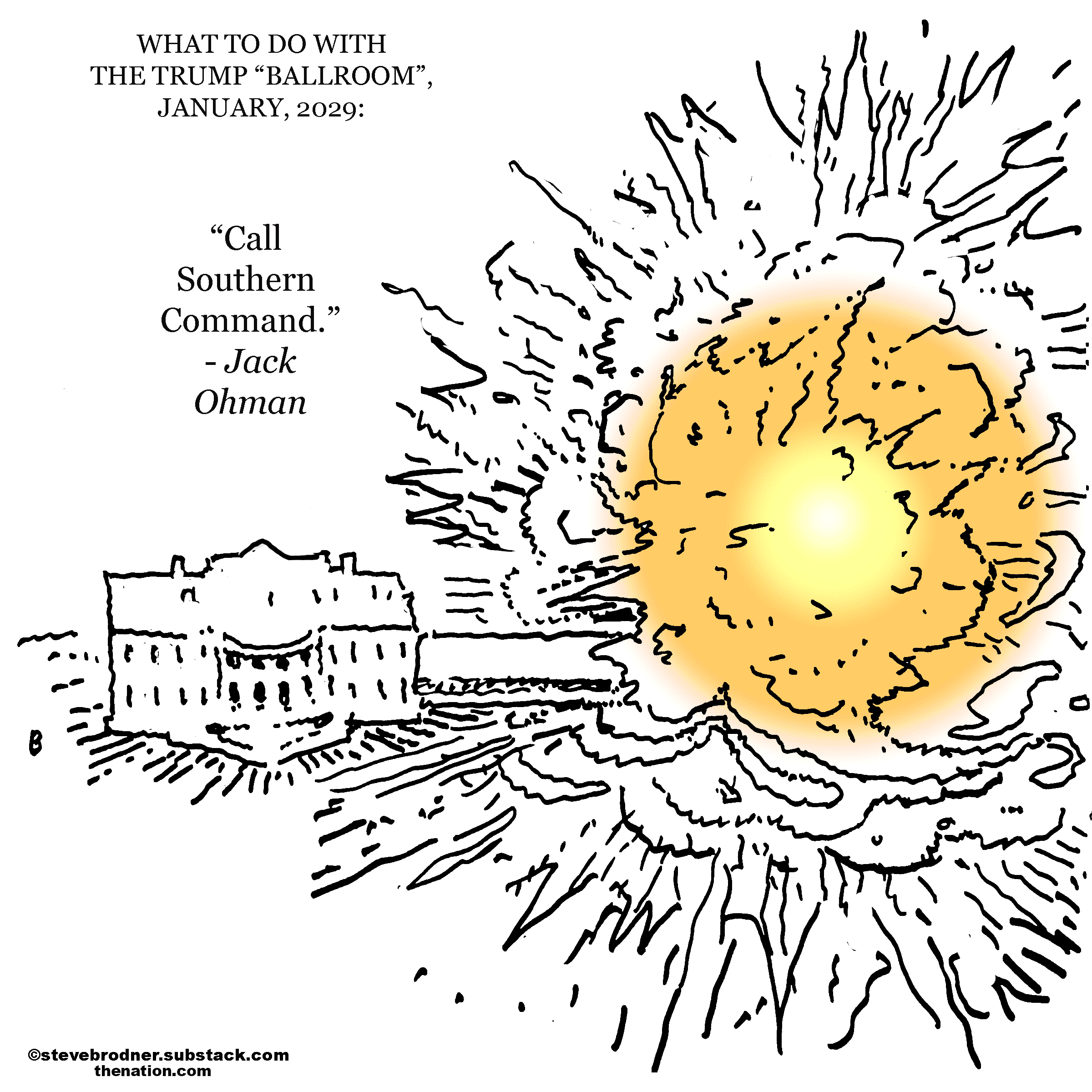
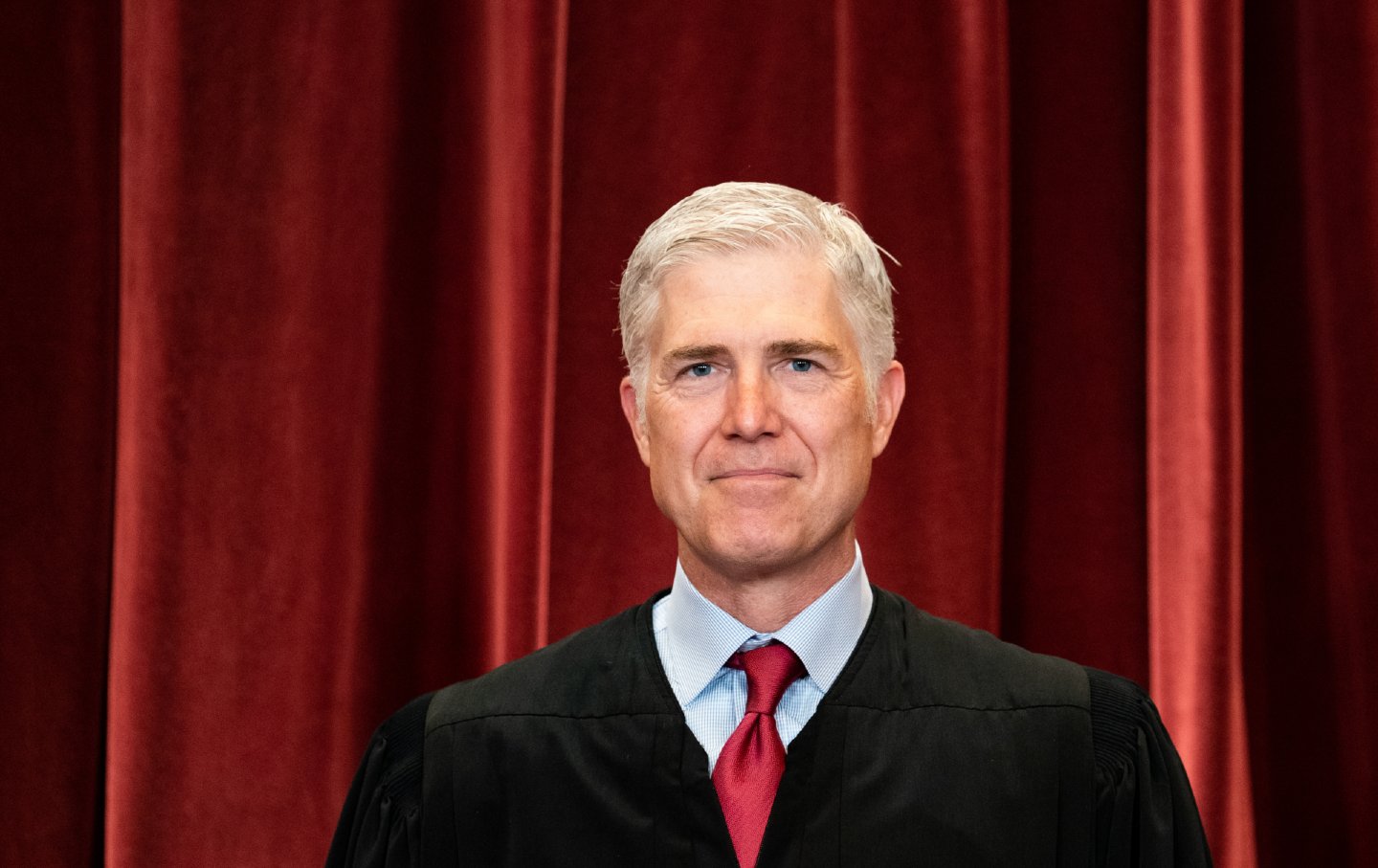
The Supreme Court Has a Serial Killer Problem The Supreme Court Has a Serial Killer Problem
In this week's Elie v. U.S., The Nation’s justice correspondent recaps a major death penalty case that came before the high court as well as the shenanigans of a man who’s angling...

Corporate Democrats Are Foolishly Surrendering the AI Fight Corporate Democrats Are Foolishly Surrendering the AI Fight
Voters want the party to get tough on the industry. But Democratic leaders are following the money instead.

Marching Against a Corrupt Regime Marching Against a Corrupt Regime
People taking to the streets for democracy.
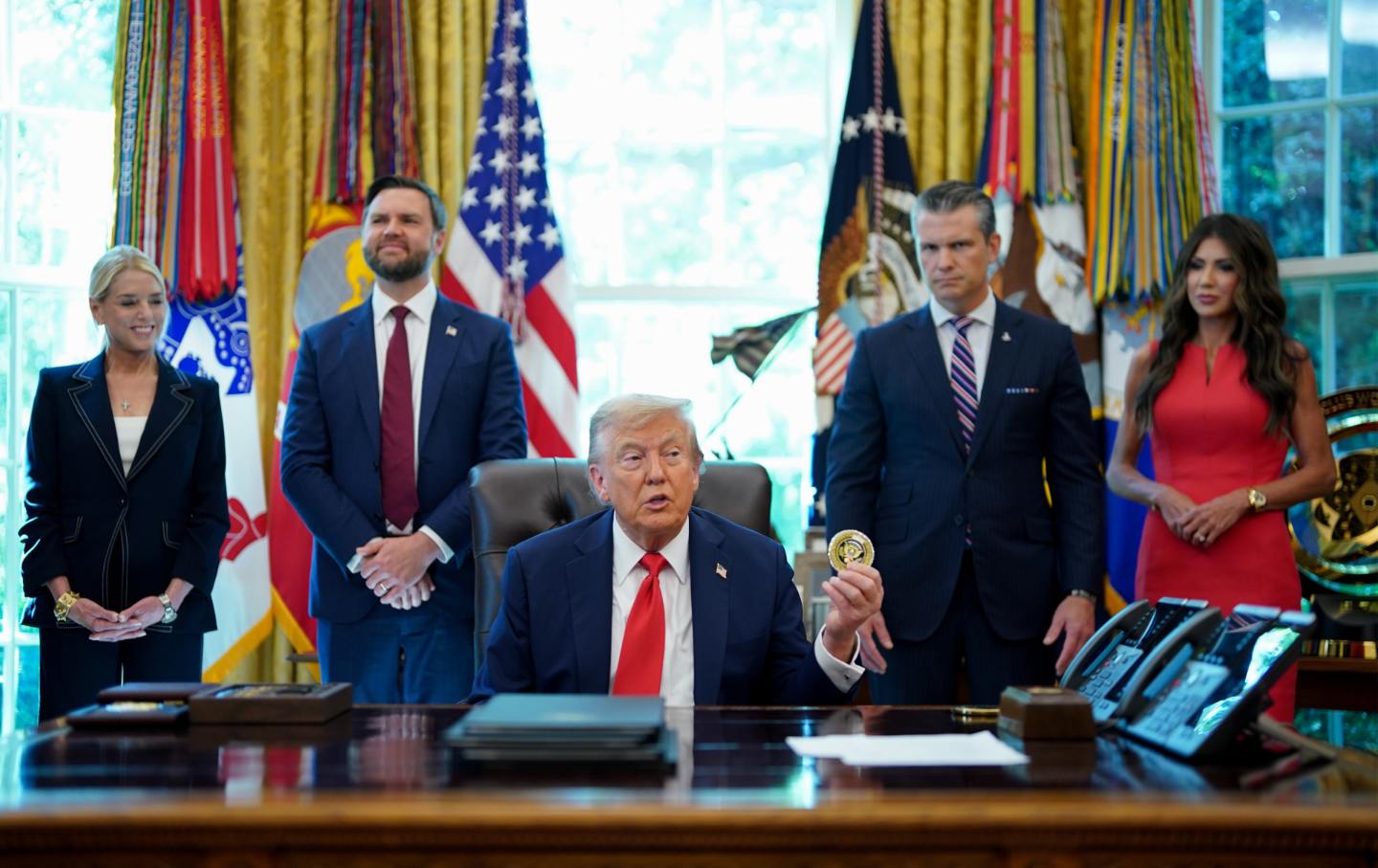
It Would Be Madness to Give Trump and His Toadies Even More Power It Would Be Madness to Give Trump and His Toadies Even More Power
And yet, that’s what the Supreme Court appears prepared to do.
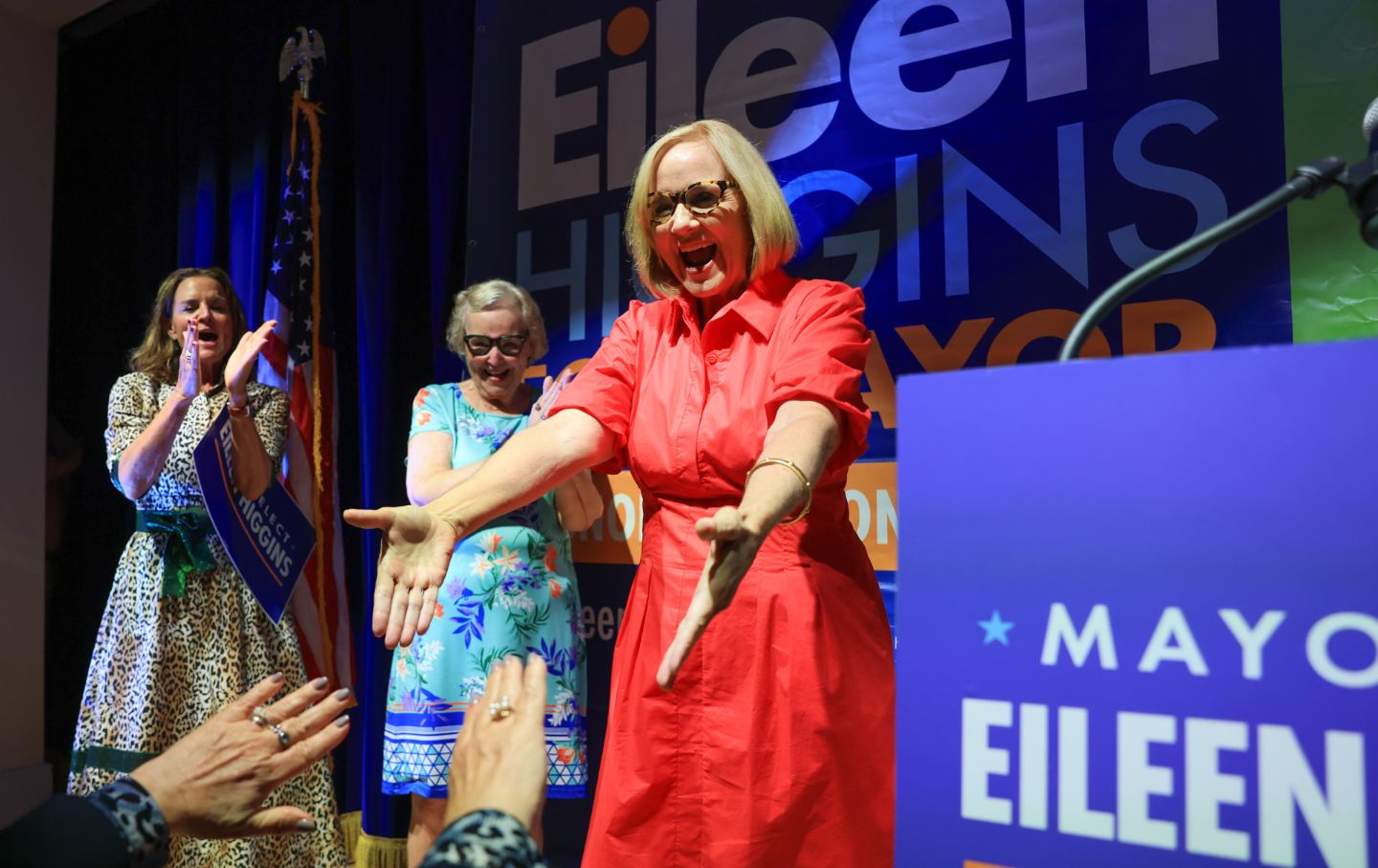
Trump Is Dragging Republicans to Crushing Defeat After Crushing Defeat Trump Is Dragging Republicans to Crushing Defeat After Crushing Defeat
The president is deeply unpopular, his policies are failing, and Republicans are losing—everywhere.


